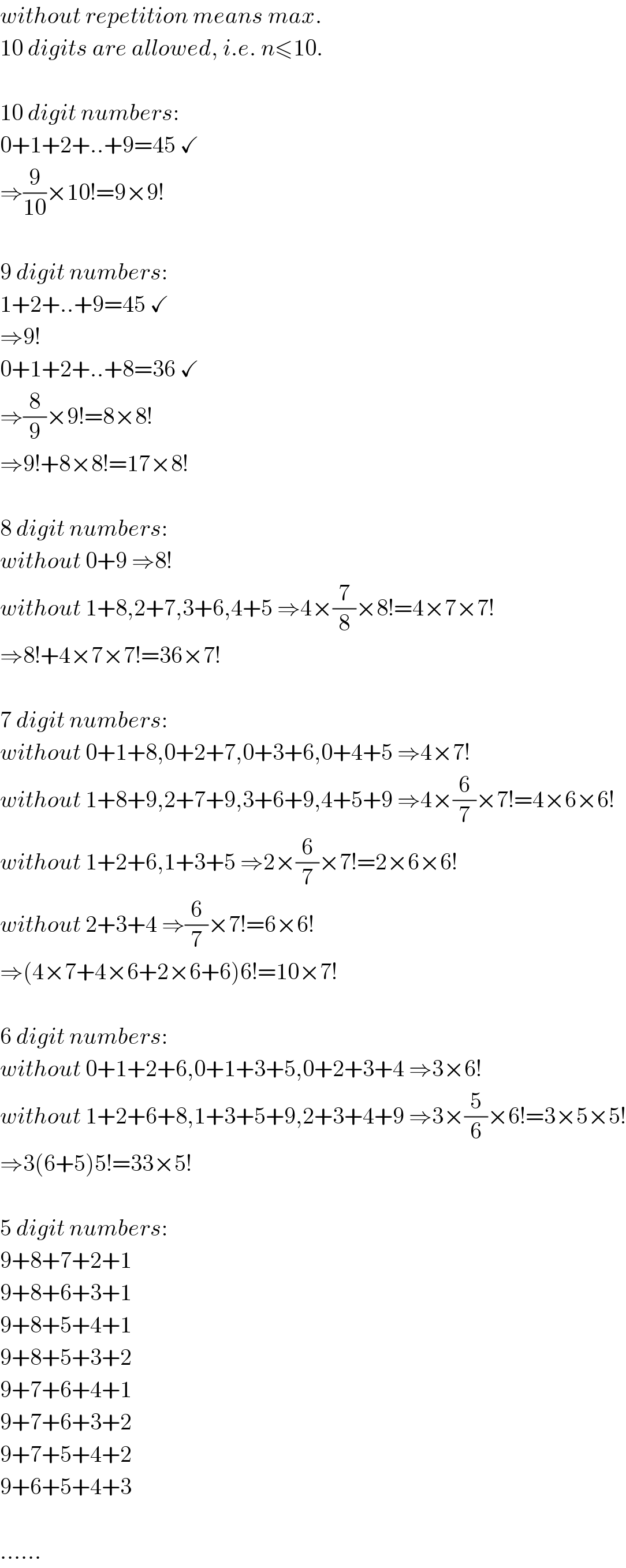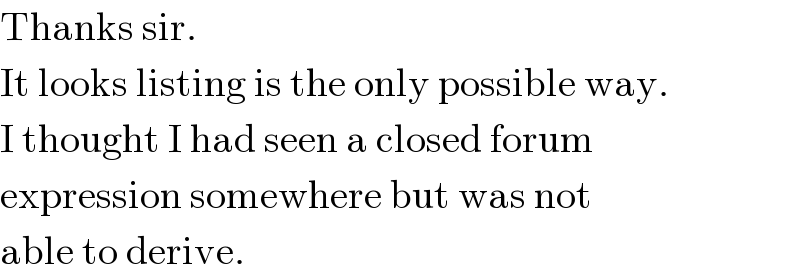
Question and Answers Forum
Question Number 118043 by prakash jain last updated on 14/Oct/20
![How many numbers in the range [1,10^n −1] are divisible by 9? digit repetitions are not allowed.](Q118043.png)
Commented by mr W last updated on 15/Oct/20

Commented by prakash jain last updated on 15/Oct/20

Answered by floor(10²Eta[1]) last updated on 24/Dec/20
![from 1 to 10^n −1 we have ((10^n −1)/9) multiples of 9 (considering the numbers with the same digits) so let′s calculate how many numbers have the same digits and are divisible by 9 [aa...a] (n digits) a.n≡0(mod9), a∈[1,9] ∧ n≥2 a∈{1, 2, 4, 5, 7, 8}⇒n=9k, k≥1 a∈{3, 6}⇒n=3k, k≥1 a=9⇒n=k≥2 2 digits: (99) 3 digits: (333, 666, 999) 4 digits: (9999) 5 digits: (99999) 6 digits: (333333, 666666, 999999) [...] 9 digits: (11...1, 22...2, 33...3, ..., 99..9) 2 digits to 9 digits: 5+3.2+9=20 cases 10 digits to 19: 7+3.2+9=22 cases from 1 to x we have x−⌊(x/3)⌋numbers that are coprime with 3 (because ⌊(x/3)⌋ is the number of multiples of 3, from 1 to x) from 2 to x we have (x−⌊(x/3)⌋−1)+3(⌊(x/3)⌋−⌊(x/9)⌋)+9⌊(x/9)⌋ x−1+2⌊(x/3)⌋+6⌊(x/9)⌋numbers that are divisible by 9 and have the same digits from 2 digits to n digits we have n−1+2⌊(n/3)⌋+6⌊(n/9)⌋ numbers that have the same digits and are divisible by 9 Ans: ((10^n −1)/9)−(n−1+2⌊(n/3)⌋+6⌊(n/9)⌋)](Q118072.png)
| ||
Question and Answers Forum | ||
Question Number 118043 by prakash jain last updated on 14/Oct/20 | ||
![How many numbers in the range [1,10^n −1] are divisible by 9? digit repetitions are not allowed.](Q118043.png) | ||
Commented by mr W last updated on 15/Oct/20 | ||
 | ||
Commented by prakash jain last updated on 15/Oct/20 | ||
 | ||
Answered by floor(10²Eta[1]) last updated on 24/Dec/20 | ||
![from 1 to 10^n −1 we have ((10^n −1)/9) multiples of 9 (considering the numbers with the same digits) so let′s calculate how many numbers have the same digits and are divisible by 9 [aa...a] (n digits) a.n≡0(mod9), a∈[1,9] ∧ n≥2 a∈{1, 2, 4, 5, 7, 8}⇒n=9k, k≥1 a∈{3, 6}⇒n=3k, k≥1 a=9⇒n=k≥2 2 digits: (99) 3 digits: (333, 666, 999) 4 digits: (9999) 5 digits: (99999) 6 digits: (333333, 666666, 999999) [...] 9 digits: (11...1, 22...2, 33...3, ..., 99..9) 2 digits to 9 digits: 5+3.2+9=20 cases 10 digits to 19: 7+3.2+9=22 cases from 1 to x we have x−⌊(x/3)⌋numbers that are coprime with 3 (because ⌊(x/3)⌋ is the number of multiples of 3, from 1 to x) from 2 to x we have (x−⌊(x/3)⌋−1)+3(⌊(x/3)⌋−⌊(x/9)⌋)+9⌊(x/9)⌋ x−1+2⌊(x/3)⌋+6⌊(x/9)⌋numbers that are divisible by 9 and have the same digits from 2 digits to n digits we have n−1+2⌊(n/3)⌋+6⌊(n/9)⌋ numbers that have the same digits and are divisible by 9 Ans: ((10^n −1)/9)−(n−1+2⌊(n/3)⌋+6⌊(n/9)⌋)](Q118072.png) | ||
| ||